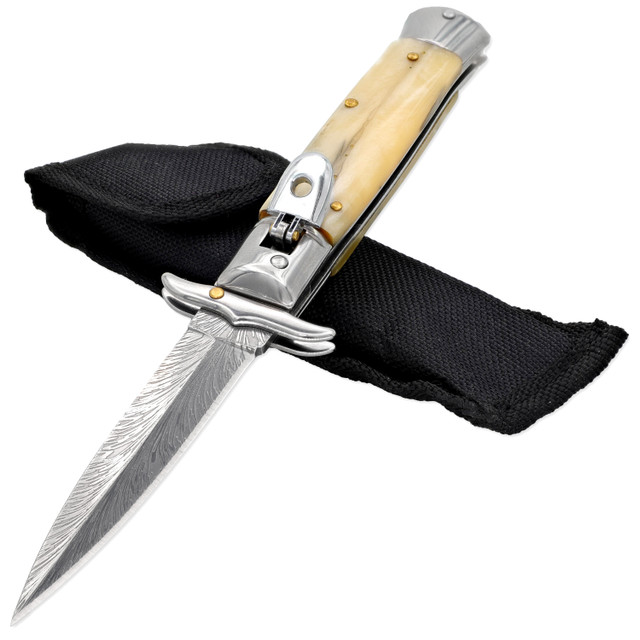Automatic Knives: A Comparison of Blade Materials and Their Benefits
Posted by SwordsSwords on Jul 24th 2024
When it comes to automatic knives, one of the most important factors to consider is the blade material. Different materials offer various benefits, and choosing the right one can enhance your knife's performance, durability, and overall user experience. In this blog, we’ll explore the most common blade materials used in automatic knives and discuss their unique advantages.
Stainless Steel Blades
Stainless steel is one of the most popular materials for automatic knives. Known for its corrosion resistance and durability, stainless steel is a reliable choice for everyday use. There are several grades of stainless steel, but a few stand out in the world of automatic knives for sale:
- 440C Stainless Steel: This is a high-carbon stainless steel known for its excellent hardness and edge retention. It’s a popular choice for many automatic pocket knife models due to its balance of toughness and corrosion resistance.
- AUS-8 Stainless Steel: A Japanese stainless steel that offers good corrosion resistance and ease of sharpening. It's slightly softer than 440C, making it easier to maintain a sharp edge.
- 154CM Stainless Steel: A high-end stainless steel known for its exceptional toughness and wear resistance. It’s a preferred material for many high-quality otf automatic knives due to its superior performance.
Benefits of Stainless Steel Blades
- Corrosion Resistance: Stainless steel blades are less likely to rust, making them ideal for use in humid or wet environments.
- Durability: These blades can withstand heavy use and retain their sharpness over time.
- Low Maintenance: Stainless steel blades are relatively easy to care for, requiring minimal maintenance to keep them in good condition.
Carbon Steel Blades
Carbon steel is another popular choice for automatic switchblade knife blades. It’s known for its exceptional sharpness and edge retention. Some common types of carbon steel used in knives include:
- 1095 Carbon Steel: A high-carbon steel that is easy to sharpen and holds an edge well. It’s a popular choice for tactical and survival automatic knives.
- D2 Tool Steel: While technically not a stainless steel, D2 offers a good balance of toughness, wear resistance, and corrosion resistance. It’s often used in higher-end automatic knives.
Benefits of Carbon Steel Blades
- Superior Sharpness: Carbon steel blades can achieve a razor-sharp edge, making them ideal for precise cutting tasks.
- Edge Retention: These blades hold their sharpness longer than many stainless steel blades, reducing the need for frequent sharpening.
- Toughness: Carbon steel is generally tougher than stainless steel, making it less likely to chip or break under heavy use.

Damascus Steel Blades
Damascus steel is renowned for its distinctive patterns and exceptional strength. It’s created by layering different types of steel and forging them together. This process results in a blade that is both beautiful and highly functional.
Benefits of Damascus Steel Blades
- Aesthetic Appeal: The unique patterns on Damascus steel blades make them highly attractive and sought after by collectors.
- Strength and Flexibility: Damascus steel blades are known for their superior strength and flexibility, making them resistant to breaking under stress.
- Edge Retention: These blades maintain their sharpness for an extended period, reducing the need for frequent sharpening.
Ceramic Blades
Ceramic blades are less common in automatic knives, but they offer unique benefits that make them worth considering. Made from zirconium oxide, ceramic blades are incredibly hard and maintain their sharpness for a long time.
Benefits of Ceramic Blades
- Superior Hardness: Ceramic blades are harder than steel, which means they stay sharp much longer.
- Corrosion Resistance: These blades are completely resistant to rust and corrosion.
- Lightweight: Ceramic blades are lighter than steel, making them easy to carry and handle.
Titanium Blades
Titanium is another material occasionally used in automatic knives. While not as hard as steel, titanium offers a combination of strength, lightweight, and corrosion resistance that makes it appealing for certain applications.
Benefits of Titanium Blades
- Corrosion Resistance: Titanium blades are highly resistant to rust and corrosion, even in saltwater environments.
- Lightweight: Titanium is much lighter than steel, making it ideal for those who prefer a lightweight knife.
- Durability: Titanium blades are tough and can withstand heavy use without breaking or chipping.
Conclusion
Choosing the right blade material for your automatic knives depends on your specific needs and preferences. Whether you prioritize sharpness, durability, or corrosion resistance, there’s a blade material out there that will suit your requirements. By understanding the benefits of each material, you can make an informed decision and find the perfect automatic pocket knife for your needs.
For a wide selection of high-quality automatic knives for sale, visit swordsswords.com. They offer a variety of automatic switchblade knife and otf automatic knives to meet your every need.

